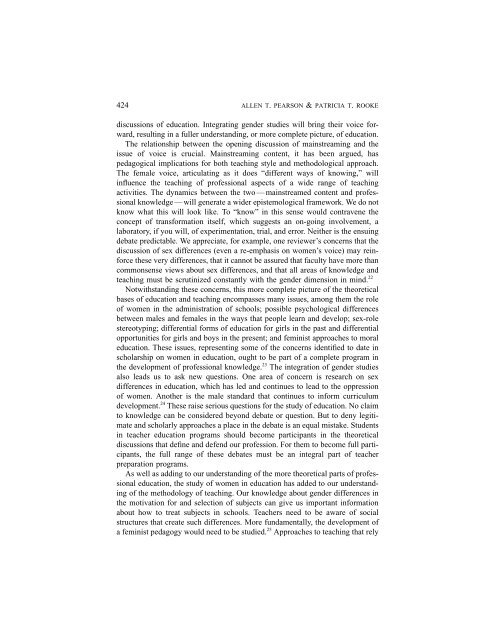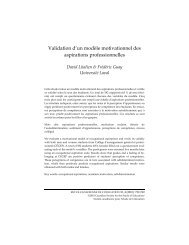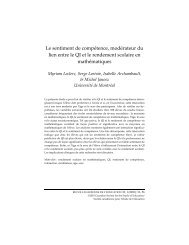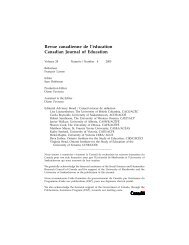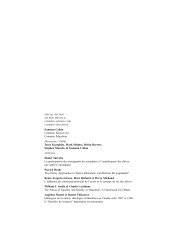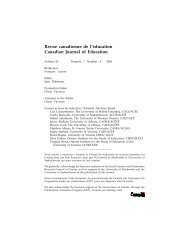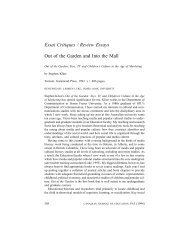Mireille Falardeau et Michel Loranger Le choix de stratégies ... - CSSE
Mireille Falardeau et Michel Loranger Le choix de stratégies ... - CSSE
Mireille Falardeau et Michel Loranger Le choix de stratégies ... - CSSE
You also want an ePaper? Increase the reach of your titles
YUMPU automatically turns print PDFs into web optimized ePapers that Google loves.
424 ALLEN T. PEARSON & PATRICIA T. ROOKE<br />
discussions of education. Integrating gen<strong>de</strong>r studies will bring their voice forward,<br />
resulting in a fuller un<strong>de</strong>rstanding, or more compl<strong>et</strong>e picture, of education.<br />
The relationship b<strong>et</strong>ween the opening discussion of mainstreaming and the<br />
issue of voice is crucial. Mainstreaming content, it has been argued, has<br />
pedagogical implications for both teaching style and m<strong>et</strong>hodological approach.<br />
The female voice, articulating as it does “different ways of knowing,” will<br />
influence the teaching of professional aspects of a wi<strong>de</strong> range of teaching<br />
activities. The dynamics b<strong>et</strong>ween the two — mainstreamed content and professional<br />
knowledge — will generate a wi<strong>de</strong>r epistemological framework. We do not<br />
know what this will look like. To “know” in this sense would contravene the<br />
concept of transformation itself, which suggests an on-going involvement, a<br />
laboratory, if you will, of experimentation, trial, and error. Neither is the ensuing<br />
<strong>de</strong>bate predictable. We appreciate, for example, one reviewer’s concerns that the<br />
discussion of sex differences (even a re-emphasis on women’s voice) may reinforce<br />
these very differences, that it cannot be assured that faculty have more than<br />
commonsense views about sex differences, and that all areas of knowledge and<br />
teaching must be scrutinized constantly with the gen<strong>de</strong>r dimension in mind. 22<br />
Notwithstanding these concerns, this more compl<strong>et</strong>e picture of the theor<strong>et</strong>ical<br />
bases of education and teaching encompasses many issues, among them the role<br />
of women in the administration of schools; possible psychological differences<br />
b<strong>et</strong>ween males and females in the ways that people learn and <strong>de</strong>velop; sex-role<br />
stereotyping; differential forms of education for girls in the past and differential<br />
opportunities for girls and boys in the present; and feminist approaches to moral<br />
education. These issues, representing some of the concerns i<strong>de</strong>ntified to date in<br />
scholarship on women in education, ought to be part of a compl<strong>et</strong>e program in<br />
the <strong>de</strong>velopment of professional knowledge. 23 The integration of gen<strong>de</strong>r studies<br />
also leads us to ask new questions. One area of concern is research on sex<br />
differences in education, which has led and continues to lead to the oppression<br />
of women. Another is the male standard that continues to inform curriculum<br />
<strong>de</strong>velopment. 24 These raise serious questions for the study of education. No claim<br />
to knowledge can be consi<strong>de</strong>red beyond <strong>de</strong>bate or question. But to <strong>de</strong>ny legitimate<br />
and scholarly approaches a place in the <strong>de</strong>bate is an equal mistake. Stu<strong>de</strong>nts<br />
in teacher education programs should become participants in the theor<strong>et</strong>ical<br />
discussions that <strong>de</strong>fine and <strong>de</strong>fend our profession. For them to become full participants,<br />
the full range of these <strong>de</strong>bates must be an integral part of teacher<br />
preparation programs.<br />
As well as adding to our un<strong>de</strong>rstanding of the more theor<strong>et</strong>ical parts of professional<br />
education, the study of women in education has ad<strong>de</strong>d to our un<strong>de</strong>rstanding<br />
of the m<strong>et</strong>hodology of teaching. Our knowledge about gen<strong>de</strong>r differences in<br />
the motivation for and selection of subjects can give us important information<br />
about how to treat subjects in schools. Teachers need to be aware of social<br />
structures that create such differences. More fundamentally, the <strong>de</strong>velopment of<br />
a feminist pedagogy would need to be studied. 25 Approaches to teaching that rely


